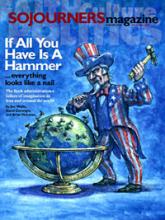It’s been a summer of sizzle and burn—theologically speaking—here in these United States. First, we find out that Christianity’s arch-traitor, Judas, has his own “gospel.” Then Dan Brown, an inventive novelist of dubious literary skill, brings to the big screen his shocking revelation that organized religion is as fertile a ground for the action thriller as Michael Crichton’s world of scientific R&D and Tom Clancy’s black ops underworld. And, let’s face it, there is no religion more organized than my beloved Catholic Church.
Let’s start with The Da Vinci Code (book and movie). Dan Brown is a hack novelist who hit upon a winning formula (spoiler alert!)—that Jesus had a child with Mary Magdalene, that their blood line survived through the ages, and that a secret para-Vatican society was charged with keeping you and me from finding out. Like most spinners of tales, Brown took the shred ends of history, threw them all in a blender, slathered them on a page with protagonists, antagonists, a central mystery (plus excellent car chases), and served it up hot off the grill to a religiously charged public. The secular fundamentalists love it because it “proves” Christianity is a bunch of bunk. The Catholic fundamentalists love it because it boosts their direct mail returns as they wage their war against “creeping gnosticism” in this post-modern era.
My greater concern is for those who are unable to distinguish between fact and fiction. Psychologists recognize this phenomenon in children who falsely perceive television programs to be “real.” When adults are unable to make this distinction because their knowledge is not broad enough to put the fiction in a factual context and they rely heavily on personal experience and individual emotions not tested in community, the results historically have been disastrous.
Read the Full Article
